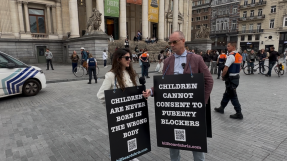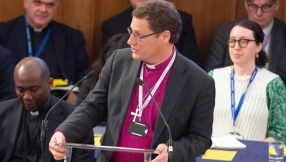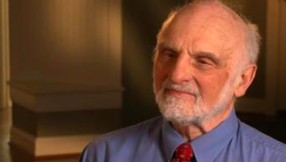The Apostle Thomas, whose life the Church celebrates today, has had the label 'doubting' around his neck for the last 2,000 years.
It's because of the story in John 20 in which Jesus appears to his disciples after his resurrection. Thomas is missing and refuses to believe their story. 'Unless I see the nail marks in his hands and put my finger where the names were, and put my hand into his side, I will not believe it,' he says.

Hence he has been 'Doubting Thomas' down all the generations. And the implication is that he's at fault, because doubt is bad; we should just believe without question.
But there's another way of looking at the story. It teaches us not that doubt is bad, but that there are times when it's perfectly in order to ask for rational proof, and times when it isn't. In other words, this a story about what counts as evidence for God.
The events narrated in John 20 take place before Jesus' ascension. He was present on earth and available to his disciples, talking with them and interacting with them. He appeared to the other disciples in a recognisable form. Thomas was perfectly entitled to say, 'When I see him myself, I'll believe it.' Jesus was establishing the credentials of his resurrection in a particular way; Thomas had missed that, and unsurprisingly he wanted to see Jesus for himself.
But the key words are in verse 29, where Jesus says to him: 'Because you have seen me you have believed; blessed are those who have not seen and yet have believed.'
'Those who have not seen' are all the generations of Christians – including our own – who have lived since the Ascension. We have never seen the resurrected Jesus in the flesh, as Thomas did (though Paul claimed his own personal meeting in 1 Corinthians 15:8 – not quite the same thing, and a special case).
So the story speaks to us about the limits of proof, and it's very challenging to Christians today. There are things about which we have every right to ask for evidence. If someone claims to have worked a healing miracle, or to have led thousands of people to Christ, or to have a new interpretation of Scripture that upends everything we've previously thought, we ought to ask for proof before we believe. Like Thomas, we can say, 'Unless I see it with my own eyes, I will not believe it.'
But the story is about belief in Jesus, and particularly in his resurrection. There are many useful books defending the resurrection out there, from Frank Morison's classic Who Moved the Stone to Lee Strobel's The Case for Christ – not to mention Justin Brierley's recently-released Unbelievable? based on years of interviewing atheists for his Premier radio show.
But intellectual defences of faith can only take us so far. In general, people aren't converted by arguments. Rather, they see the resurrected Christ in other people – in Christians who have been changed by their encounter with him and live better because of it. So the challenge to Christians is, 'Will we live so well that people will trust us to show them the way to Christ?'
No one alive today can see Christ in the flesh and believe the evidence of their own eyes. But they can see his work in the lives of faithful believers and come to faith in him because of that. And as Hebrews 11:1 says, 'Faith is the substance of things hoped for, the evidence of things not seen.'













